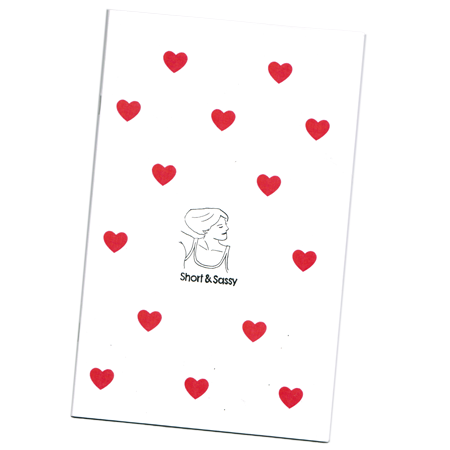 |
“Short & Sassy” by Yuko Weiner is a Japanese/English bilingual perzine. Yuko has a feminist revelation when her husband calls her new haircut “short and sassy” — she questions why short haircuts on women are considered “sassy”, while the same haircut on a boy is just hair. This leads her to examine her own relationship to gender, feminism, and identity through ruminations, poetry, a Tweet, and illustration. She grapples with what others have told her feminism is, but comes to the movement on her own terms. Feminism as “a tool to look inside, not a weapon to attack others…”, a tool to question the past and to find empathy and empowerment. Each spread features writing in English on the left side of the page and Japanese on the right. I like how this format mirrors the themes that show up in Yuko’s writing. In the essays “Japanese Feminism” and “Japanese Feminism 2”, Yuko contrasts American individualism with Japanese commonality, but points out that how both systems can be suffocating or exhausting, and that misogyny and patriarchy exist within both. The images may be mirrored, but what they show (or what the pages say) stays the same. Yuko’s reflections on the chasm between the cultural norms of where we grew up and the people we’ve grown into being are relatable and ring true. 📓 Details: half-size, full color💌 : $5 + s&h via website 🔗 : instagram 1 •instagram 2 • email |

“Short & Sassy” by Yuko Weiner is a Japanese/English bilingual perzine.
Yuko has a feminist revelation when her husband calls her new haircut “short and sassy” — she questions why short haircuts on women are considered “sassy”, while the same haircut on a boy is just hair. This leads her to examine her own relationship to gender, feminism, and identity through ruminations, poetry, a Tweet, and illustration. She grapples with what others have told her feminism is, but comes to the movement on her own terms. Feminism as “a tool to look inside, not a weapon to attack others…”, a tool to question the past and to find empathy and empowerment.
Each spread features writing in English on the left side of the page and Japanese on the right. I like how this format mirrors the themes that show up in Yuko’s writing. In the essays “Japanese Feminism” and “Japanese Feminism 2”, Yuko contrasts American individualism with Japanese commonality, but points out that how both systems can be suffocating or exhausting, and that misogyny and patriarchy exist within both. The images may be mirrored, but what they show (or what the pages say) stays the same. Yuko’s reflections on the chasm between the cultural norms of where we grew up and the people we’ve grown into being are relatable and ring true.
📓 Details: half-size, full color💌 : $5 + s&h via website
🔗 : instagram 1 •instagram 2 • email

